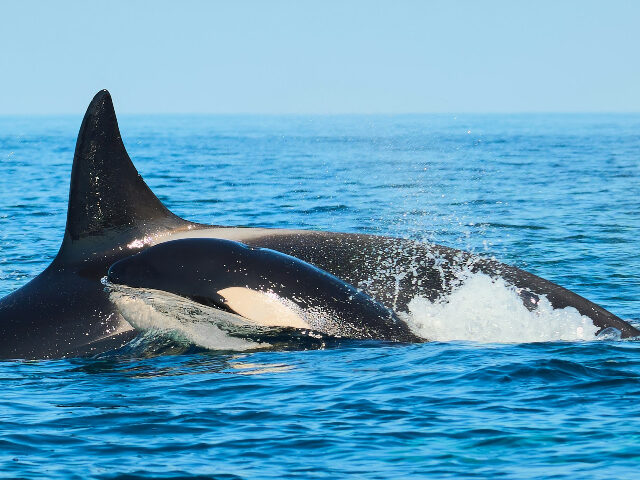A killer whale that gained international sympathy after carrying her dead calf 1,000 miles for over two weeks in 2018 has given birth again, researchers announced.
The new baby orca was recently seen off the coast of Washington state, and was determined to belong to the whale known as J35, or “Tahlequah,” according to the Center for Whale Research (CWR):
The Center for Whale Research has received additional information on the new calf born into J pod. On Monday, 12/23, a…
Posted by Center for Whale Research on Tuesday, December 24, 2024
The researchers also said they think the new calf is a female, and assigned her the label of J61 because she has been traveling with her mother in the “J pod” of orcas.
While the center’s team has “expressed concern about the calf’s health based on the behavior of both J35 and J61,” they noted that early life for killer whales typically has a high risk of mortality and they “hope” that Tahlequah is able to keep J61 alive “through these difficult early days.”
“CWR, along with the rest of the research community, is eager to conduct follow-up observations of the calves’ behavior and physical condition when possible,” the center added.
Seattle-area agency Sealife Response, Rehab, and Research, which conducts photogrammetry and body measurements of the whales, stated they believe that the calf was born prematurely, according to a Facebook post from the Orca Conservancy:
We have learned of some new updates on the newest calf born into J Pod! The @centerforwhaleresearch has confirmed J35 Tahlequah as the mother and has officially designated the calf as J61!Reaearchers are not without concern in regards to the new calf. @sealifer3 , the agency that conducts photogrammetry and body measurements have stated they believe the calf to be premature, and added that J35 appeared in subnormal body condition in October. Ideally mothers need to be robust with ample fat storage to help with the demands of lactation.Researchers with @noaafisherieswestcoast were able to spend time on the water with J61 and stated they observed the calf remaining underwater for extended amounts of time indicating nursing or attempts to nurse. The calf had also been observed being pushed around on J35’s head and was not looking lively, which is a concern, but also added calf behavior is not fully understood.All of this serves as a reminder that in order for new calves, salmon stocks need to be recovered to levels that will help support population growth.
Posted by Orca Conservancy on Tuesday, December 24, 2024
The nonprofit added that Tahlequah appeared to be in “subnormal body condition” when she was pregnant in October.
“Ideally mothers need to be robust with ample fat storage to help with the demands of lactation,” the conservancy said.
They also noted that researchers with the National Oceanic and Atmospheric Administration’s (NOAA) West Coast Fisheries Management and Marine Life Protection agency observed the calf “remaining underwater for extended amounts of time indicating nursing or attempts to nurse.”
“The calf had also been observed being pushed around on J35’s head and was not looking lively, which is a concern,” the Orca Conservancy added, but explained that “calf behavior is not fully understood.”
Tahlequah made headlines in August 2018 after she carried her baby, who died soon after birth, on her head for at least 17 days, “in an image of grief that struck an emotional chord worldwide,” according to CBS News.
Ken Balcomb of the CWR said she carried the calf’s body for 1,000 miles:
“She literally is pushing her baby to connect with it and, hope against hope — hoping that it will take a breath, which it will never do,” biologist and wildlife conservationist Jeff Corwin told CBS at the time. “I can imagine this [mourning period] could take a very, very long time.”
According to Corwin, grief in some orca whales has to “take its course,” just like in humans.
It would have been “stressful” for the grieving mother if anyone had intervened in her mourning, he added.
“The world isn’t ready for another heartbreaking loss of a calf, especially this calf to this mother,” one Facebook commenter wrote on the CWR’s announcement post.
“I hope she’s able to, my heart broke last time watching her mourn for so long. She’s the reason I fell in love with orcas. I hope with all my heart that this little one survives,” another orca fan wrote.

COMMENTS
Please let us know if you're having issues with commenting.